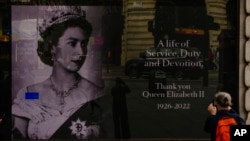For more on Zambia’s day of national mourning and the legacy left by the late British leader in the southern African nation, VOA’s James Butty spoke to Antony Bwalya, President Hakainde Hichilema’s spokesperson.
The interview was edited for brevity and clarity.
VOA: Tell us more about President Hakainde Hichilema’s declaration of the National Day of Mourning?
Bwalya: Queen Elizabeth II was important to the global community. She was a symbol of peace, stability, and continuity. The president looks to follow her example as we provide leadership for the people of Zambia.
The President issued a directive that all flags must fly at half-mast since the passing of Queen Elizabeth. In addition, Monday has been declared a day of national mourning which will be observed across Zambia.
VOA: Does this mean that Monday the 19th of September will be a national holiday?
Bwalya: It is a day of national mourning. It is a day for all of us to reflect and appreciate the work done by Queen Elizabeth II. This is a day of national morning as opposed to it being a national holiday.
VOA: What would you say to people who question the day of national mourning declaration and add, this brings back memories of British colonialism in Zambia?
Bwalya: We cannot disregard the importance of history. There are several things that have happened in many parts of the world over the course of our respective long histories. We must learn from that history, remember the atrocities, but at the same time appreciate the good work from those who have gone before us.
I think it is in good order to focus on the positives of what was a life of service and dedication to duty by Queen Elizabeth not just in the United Kingdom and the Commonwealth, but throughout the entire world. I think that is what the focus should be right now.
